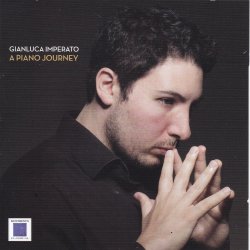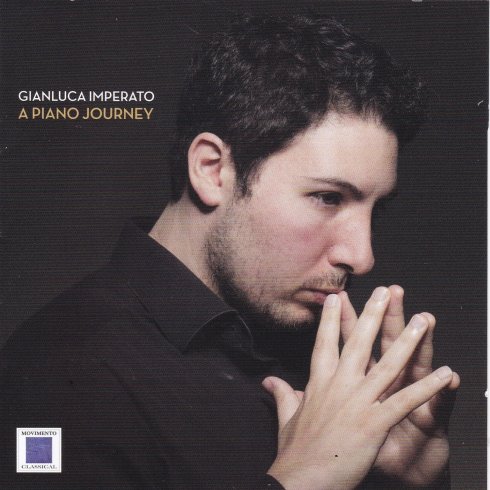

A piano Journey
Gianluca Imperato
A piano Journey
Caminante no hay camino, se hace camino al andar.. So says the poem Cantares by Antonio Machado, so dear to those who undertake the Camino de Santiago : "Pilgrim there is no path but only walking". Therefore, the destination is not important, but the path one takes day after day, with one's feet but also with one's own spirituality. And something similar also echoes in this record in which the listener is guided within very different sound worlds, seemingly without a defined logic, between the 19th and 20th centuries and then returns to that 18th century that sees in Domenico Scarlatti an undisputed master.
If we then add an unpublished transcription from the Sleeping Beauty of Tchaikovsky, combined with his nocturnal op.19 n, 4, then the circle closes: the interpreter, the pianist Gianluca Imperato, at the absolute debut with this label, not only travels with his times, his ideas, his emotions but also goes beyond, he puts his own style without the fear of confrontation with those who preceded him. And if the journey is the center of this recording, Franz Liszt could certainly not be missing. With the second ballad we are in 1853, in the middle of the Weimar period, after the tiring years of the concert tours that had seen Franz, "the first concert pianist in the history of music", tossed here and there in every corner of Europe. Liszt’s music acquires more and more that contrasting physiognomy of light-shadow, divine-malefic that will remain a cornerstone of his production until the last examples of “La lugubre gondola” or “Nuages gris”. It does not matter, then, whether in listening to this ballad one must take into consideration the literary suggestion of the classical myth that tells the love between Hero, priestess of Aphrodite, and the young Leander, who every night swims to his beloved led by a faint little light. The myth of love and death, so loved by romantic artists, provides only the symbolic horizon of this virtuoso piece.
From those who have travelled a lot with trains and carriages to those who have done it in their art in search of an ideal of "total" music. Aleksandr Scriabin, "clearly a madman, full of tics and unable to sit still" according to the testimony of Vladimir Horowitz, was a sui generis artist in the music scene between the 19th and 20 th centuries. Just think of the influence in his music of superhomistic theories, theosophy and mysticism. Not to mention his theory that closely related colors to musical notes and the monumental "multimedia" opera, designed shortly before his death, which should have taken place on the peaks of the Himalayas: a "total" opera in which all the senses would be involved with sounds, dances, lights and perfumes.
The first Scriabin, that of the tracks chosen in this record, is actually a composer still strongly linked to tradition and in particular to Frederic Chopin, seen as a real source of inspiration. Here then is explained the use in the preludes op. 11 of the same harmonic path of the preludes op. 28 by the Polish composer; but also the obvious parallelism between the impervious fantasia op. 28 and the fantasia op. 49 or between the study op.8 n° 12 and the "revolutionary" op.10 n° 12. It is in some cases a real symbiosis, as when Scriabin dedicates himself to the Chopiniana form par excellence pulling out of the cylinder the wonderful nocturnal op. 9 for the left hand only in D flat major, coincidentally the same tonality of the famous op. 27 n° 2 presented in this recording. And if passing to Sergej Rachmaninov we expect works by a pianist-composer who simply relies on turgid melodies and never-ending lyricism, we are very much mistaken. The "Etude Tableaux op.33" continue to talk to us about music that goes beyond the limit of mere listening. The combination of music and image (tableaux), the idea of producing "musical evocations starting from external visual stimuli" ,however,should not be understood in the Scriabinian idea we have just seen. Rachmaninov himself clarifies: "I don’t think the artist should reveal too much of these images. We must leave the listener free to paint for himself what the music most suggests to him". A Rachmaninov, therefore, that exalts the imaginative freedom of the listener exactly as Claude Debussy will do in his two books of preludes, writing the title of each composition only at the end, never at the beginning. And so much goes the imagination with the n° 3 and n° 8, two of the most poignant of the cycle, which put the pianist to the test both for the unconventional hands positions and for the emotional hold.
The same could be said for another landmark, increasingly present in the repertoires of contemporary pianists and orchestras. The Valse by Maurice Rave], written in the winter between 1919 and 1920, is a work that is very much affected by the difficult moment in which the composer finds himself, struck by physical and moral dejection following the end of the war and the death of his mother. Diaghilev, impresario of the Ballets russes, had commissioned a "choreographic poem" to him but what came out was far from his expectations. The kindness and frivolity of the Viennese waltz à la Strauss junior (from which Ravel takes inspiration), leaves the place to light terru but whose momentum towards the paroxysmal climax reveals something dark and tormented, already prefigured by the initial dull murmuring. The challenge of the pianist here is to make one forget the orchestral version and to "touch" the piano through those arduous and risky paths which are however able to pull out the infinite tonal nuances of the instrument. Caminos sobre la mar("Walk over the sea") is what Machado tells us but the pianist-traveler does not get discouraged in front of anything.


GIANLUCA IMPERATO
Gianluca Imperato was born in 1981 and after having obtained a second level degree at the Conservatory of “San Pietro a Majella” in Naples with full marks, he began his studies in Germany under the guidance of Professor Matti Raekallio and then continued at the “Chopin University” of Warsaw with Professor Alicia Paleta-Bugaj. He perfected his studies by attending lectures with Professor Boris Petrushansky, Roberto Plano, Donatella Sollima and Antonio di Cristofano. Gianluca Imperato made live recordings for "Radio Popolare" and "Radio Classica". His first CD "A piano Journey", which includes music from Scarlatti to Ravel for the "Movimento Classical" label, was highly appreciated by critics and received an enthusiastic reception from the public and critics . In 2017 he released the album "Reinhold Gliere piano works" for "Brilliant Classics" which includes several songs in the world premiere recording . Gianluca has won many prestigious international piano competitions and has been awarded with several scholarships including the scholarship of the G.Solti Foundation (2012) and the scholarship offered by the Italian Ministry of Foreign Affairs. He regularly performs in some of the most known institutions in Europe including the "Società dei concerti" in Milan, Chopin Society (Warsaw), Ravello Concert Society, Cervo festival, Fondazione Santa Cecilia in Portogruaro and in important concert halls such as "Chopin Hall", Lazienki Park (Warsaw), Conservatorio G.Verdi, Palazzo delle stelline (Milan), Teatro Jofre de Ferrol (Spain), Auditorium M.Ravel (Paris).
